An underground mining company’s reckless excavation beneath Tarkwa’s bustling main market has caused a dramatic cave-in that exposed the deadly risks lurking beneath Ghana’s gold mining communities, disaster management officials confirmed Friday.
The National Disaster Management Organisation identified illegal mining activities as the direct cause of Tuesday’s collapse at “Mbesiafo Gua Mu” near Tarkwa main market, where an unnamed company had dangerously mined close to the surface directly beneath the commercial hub.
Ronald Reagan Ofosu, Tarkwa Nsuaem Municipal Director of Operations for NADMO, revealed that investigators discovered the mining company had removed crucial natural support pillars including rocks and sand, leaving the ground catastrophically unstable beneath one of the region’s most active trading areas.
The company’s failure to install any reinforcement after removing natural supports created conditions that made collapse inevitable, according to NADMO’s assessment. Daily trading activities and foot traffic above the weakened ground ultimately triggered the cave-in that now threatens lives and livelihoods in the heart of Tarkwa’s commercial district.
Despite the immediate danger, NADMO has granted the unnamed mining company three days to fill the dangerous void after initially demanding completion within 24 hours. The extension came after the company requested additional time to properly address the extensive damage caused by their operations.
Ghana National Fire Service personnel are monitoring the remedial work alongside daily NADMO inspections, but the company’s identity remains shrouded in mystery. Ofosu explained that representatives who contacted NADMO failed to provide company identification, claiming their documentation remained incomplete and under review with the Minerals Commission.
The incident highlights the broader crisis of unregulated mining activities plaguing Tarkwa, where the pursuit of gold often undermines public safety. The affected area sits atop old underground mine shafts where local miners have assumed control, creating a patchwork of dangerous excavations beneath populated areas.
In a testament to economic desperation, traders whose businesses were directly affected by the collapse continue operating mere inches from the gaping void. One trader captured the harsh reality facing many residents, explaining they cannot stop work because school fees and family survival depend on their daily earnings despite the life-threatening risks literally beneath their feet.
The cave-in represents just the latest manifestation of mining-related disasters that have plagued the Tarkwa-Nsuaem Municipality. NADMO has previously attributed perennial floods in the area to illegal mining activities in river bodies, affecting fifteen communities and leaving residents homeless for extended periods.
Recent enforcement actions saw twelve arrests as illegal mining operations destroyed approximately 2,000 mature rubber trees at Ghana Rubber Estate Limited, demonstrating the widespread environmental and economic damage caused by unregulated gold extraction activities throughout the region.
The crisis extends beyond immediate safety concerns to fundamental questions about regulatory oversight and enforcement. The unnamed company’s ability to conduct extensive underground mining operations without proper documentation raises serious concerns about the effectiveness of current monitoring systems designed to prevent such dangerous activities.
NADMO has initiated educational campaigns targeting miners and the general public about the dangers associated with underground mining activities, but the persistence of such operations suggests deeper systemic challenges in Ghana’s mining governance.
The Tarkwa market incident serves as a stark reminder of how Ghana’s gold rush continues to generate wealth while simultaneously creating life-threatening hazards for ordinary citizens. As traders balance survival against safety, the collapse exposes the human cost of unregulated mining in communities where economic necessity often overrides personal safety considerations.
The ongoing remedial work will test whether regulatory authorities can effectively address immediate dangers while developing longer-term solutions to prevent similar incidents in a region where gold mining remains both economic lifeline and existential threat.
Source: newsghana.com.gh











